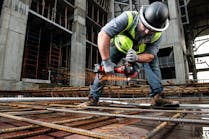The South Carolina Section of the American Society of Civil Engineers (ASCE) has released the 2021 Report Card for South Carolina’s Infrastructure. In the report, the group graded South Carolina’s:
- Aviation (D+)
- Bridges (C)
- Dams (D)
- Drinking water (D+)
- Ports (B)
- Roads (D)
- Transit (D+)
- Wastewater (D)
The South Carolina Department of Transportation responded with a press release suggesting that the ASCE use data “from 2-3 years ago regarding the physical condition of the state’s roads and bridges and combined that with several other factors, including additional needs for investment, in order to generate the score for South Carolina.
“While even this aged road data shows South Carolina slightly ahead of the National score for roads, it also underrepresents the improvements made since the passage of the state gas tax increase.”
In a prepared statement, Secretary of Transportation Christy A. Hall said:
“During the past five years, our state leaders have made significant new investments in repairing South Carolina’s roads and bridges, which have suffered from 30 years of underfunded maintenance. As promised under its 10-Year Plan, SCDOT is resurfacing aging roadways, replacing and rehabilitating structurally deficient bridges, widening key portions of our interstates, and making our most dangerous rural roads safer. While ASCE’s pavement condition rating of our roads is based on 2018 data, SCDOT continues making significant progress each year. In fact, we’re ahead of schedule in delivering needed improvements to the state’s transportation network.”
Hall called for increased federal funding for the state.
What does the ASCE recommend for South Carolina?
- The federal government should fully fund authorized infrastructure programs to invest in South Carolina’s aging infrastructure to support the growing population.
- Continue the current momentum and trend that state and local agencies as well as utilities have taken to invest traditional funding and newly implemented revenue channels toward maintaining and improving infrastructure.
- Design, operate, maintain, and expand infrastructure using consensus-based codes and standards, focusing on resilience and life cycle cost as the best measures of infrastructure performance and best use of taxpayer dollars.
- Develop a comprehensive education campaign on the true costs and savings associated with investment in critical infrastructure and disseminate it statewide through publicly accessible channels.
- Establish funding and grants to assist programs that enhance the quality of public service in the areas such as drinking water, wastewater, regional transit and aviation. These programs would consist of utility consolidation where appropriate, resilience improvements, capacity-related infrastructure upgrades, and technical career training that retains South Carolina’s talent.
- Ensure that infrastructure investment is strategically focused on efforts that maximize good-paying jobs, promote South Carolina’s economic competitiveness, and enhance usability for the state’s residents and visitors.





